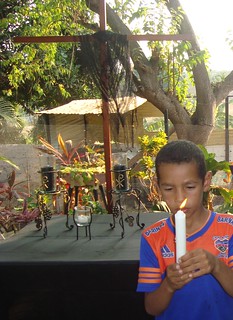"For Christ also suffered once for sins, the righteous for the unrighteous, that he might bring us to God, being put to death in the flesh but made alive in the spirit, in which he went and proclaimed to the spirits in prison, because they formerly did not obey, when God's patience waited in the days of Noah, while the ark was being prepared, in which a few, that is, eight persons, were brought safely through water. Baptism, which corresponds to this, now saves you, not as a removal of dirt from the body but as an appeal to God for a good conscience, through the resurrection of Jesus Christ, who has gone into heaven and is at the right hand of God, with angels, authorities, and powers having been subjected to him." 1 Peter 3:18-22
On Holy Saturday, between our remembrances of the Crucifixion and the Resurrection, it is good to meditate on this, the Scriptural passage which provides the primary basis for the assertion that Christ "descended into hell" found in both the Apostles and Athanasian creeds. Christians also have seen references to this doctrine in other scriptural passages such as Ephesians 4:8–9 and Romans 10:6–8. As Lutherans, we did not interpret "preaching to the spirits in prison" to mean that Jesus set free from hell the souls of unbelievers who died before the Flood or the souls of Old Testament patriarchs and saints from some kind of limbo. Rather, Christ descended into hell to declare His triumph as God’s Messiah over death and the power of the devil. “We simply believe that the entire person (Jesus Christ), God and man, descended into hell after the burial, conquered the devil, destroyed hell’s power, and took from the devil all his might” (Formula of Concord, Solid Declaration, Article IX).
This was a part of the punishment which came upon the condemned and upon the demons in hell that they saw and heard Christ proclaim Himself as the Victor over death and hell, and were obliged to tell themselves that they might have partaken of this glory of the great Hero of mankind, if they had not deprived themselves of this blessing by their revolt against Him and by their unbelief. Thus the descent into hell was not part of Christ's state of humilliation (in which He divested Himself of His divine power), but rather part of His exaltation (in which He took up His divine power once more).
Among the spirits in prison to whom the victorious Christ manifested Himself were the souls of those people who in the days of Noah had refused to heed the preaching of that man of God, and probably jeered at him for building his big ship on dry land. For one hundred and twenty years the Lord had Noah preach repentance to his neighbors. But they refused to heed his warning and have thus become an example to the unbelievers of all times, all of whom may expect to meet with the same condemnation. As unbelievers were destroyed by water in the days of Noah, it is by the water of baptism that we now enter into the ark, that is, the church, and are saved from the destruction by fire that is to come. Yhe spiritual gifts and blessings which are the result of the resurrection of Christ, the certainty that God has accepted the sacrifice of His Son and granted forgiveness of sins to the whole world, are transmitted to the believer in baptism.
In the context of the preceding verses of chapter 3 of his epistle, the Apostle Peter is urging Christians to live in piety and brotherly love, even in the midst of suffering and persecution. Christians may sometimes have to bear evil for a season, but nothing can really work lasting harm in their case, for they are under God’s care and protection. No enemy can take away from us the true, eternal blessings: God’s grace and mercy, forgiveness of sins, righteousness, peace with God, joy in the Holy Spirit.
As a missionary church, we have the task of proclaiming God Word into all the world. As the parable of the sower teaches us (Luke 8:4-15), we have no guarantee that the seed, which is the Word of God, will fall on good soil and yield an abundant harvest. That is up to the Holy Spirit. We first must call all people to repentance, that the Lord's lost sheep may be gathered in the fold of the Church and be saved. But, as in the days of Noah, there will be many who will scoff and refuse the call to repentance. We must continue the proclamation of the Word in the face of widespread rejection, not only in the hope of saving some, but also that our witness now may be testimony against the unrighteous on the day of judgment.
It may happen that the malice of our enemies will reach a point where the very fact of Christians leading a blameless life will act as a spur to their hostility, and make them all the more determined to cause us suffering. There seem to be too many cases of this to count in our world today. But we remain steadfast in the assurance that the Jesus who died, descended into hell and rose again from the dead, is seated at God the Father's right hand with all power and authority given to Him.
Here at Epiphany Lutheran Mission, we live in a country in rocked by a crisis with political, economic and humanitarian dimensions. This crisis is not the result of a natural disaster, such as an earthquake, drought or flood, although we have had all of those things in recent years. It is not the result of a lack of human or natural resources.The crisis is mainly a result of the destructive power of false belief. When our Lord lived on earth, there were those who thought that the promised Messiah would be a Jewish superhero who would throw out the hated Romans and restore Israel to its ancient glory. After the feeding of the 5,000, there were those who wanted to seize Jesus and make Him their "bread king", someone who would always provide them with whatever they wanted without anyone having to work. Even in Latin America today, people still look for these types of "messiahs", but, of course, false gods always fail and bad ideas have bad consequences.
Nevertheless, it is not our mission to agitate for political or social reform, but rather to point people to the true hope of eternal life in Christ, the true source of every blessing. We give thanks to God, that with the prayers and financial support of many, we have been able to proceed with the construction of a chapel and learning center, despite the difficulties surrounding us.
My flesh also shall rest in hope, because you will not leave my soul in hell. Into your hand I commit my spirit. You have redeemed me, O Lord !, God of truth. You, Lord, I have trusted, let me never be confounded. Amén.


No comments:
Post a Comment